Things I saw while walking the dog today






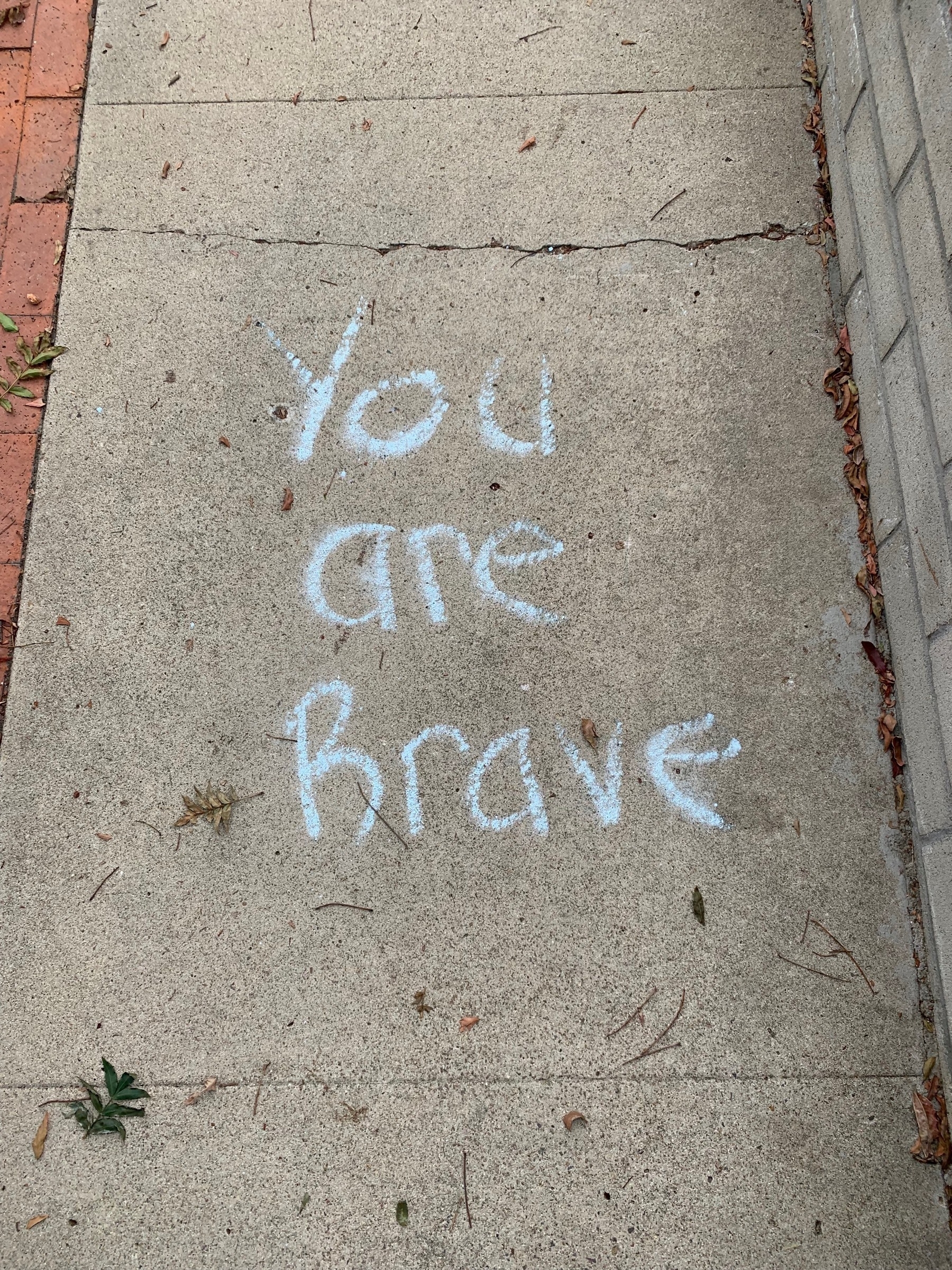
When Moviegoers Started Watching Films From the Beginning.
Throughout the classical Hollywood era, moviegoers dropped in on a film screening whenever they felt like it, heedless of the progress of the narrative. In the usual formulation, a couple go to the movies, enter midway into the feature film, sit through to the end of the movie, watch the newsreel, cartoon, and comedy short at the top of the program, and then sit through the feature film until they recognize the scene they walked in on. At this point, one moviegoer whispers to their partner, “This is where we came in,” and they exit the theater.
This is how I remember watching when I was a little boy being brought to the movies by my parents in the 1960s.
Alfred Hitchcock changed the national moviegoing habits with the release of “Psycho” in 1960. Hitchcock was a brilliant publicist for his own products, and a big publicity gimmick for “Psycho” was the demand that movie theater owners bar the doors and refuse to allow new audience members in after the movie began. Guards were stationed at the door.
Do you really need to walk 10,000 steps a day? And 17 other fitness ‘rules’, tackled by the experts. Do you need to stretch before and after exercise? Is running bad for the knees? Is sex good exercise?
People & Blogs: Manuel Moreale is doing a series of interviews with bloggers. Here are Rachel K. Kwon and Micro.blog founder Manton Reece.
I like finding out about how other people do blogging. It gives me ideas.
And I like the layout of Kwon’s home page, separating different types of posts into sections. It’s bothered me for a while that my blogging is mixed-up and spread across Facebook, Micro.blog, Tumblr, Mastodon and Bluesky.
Cory Doctorow: The proletarianization of tech workers. As employers turn the screws, tech workers are organizing.
Things I saw walking the dog this morning. I wish I’d stood directly in front of that rattan couch and centered it in the photo.





Currently reading: Track Changes by Matthew G. Kirschenbaum 📚

Finished reading: Reader, Come Home: The Reading Brain in a Digital World by Maryanne Wolf 📚
I saw this car at the park today. It has been places.

Lake Murray this afternoon.

Overheard: My kid throws such a fit any time his bread gets a little burnt, I’m starting to think he’s black toast intolerant.
Overheard: Sometimes a joke is a great way to break tension during an unpleasant situation, and lately, l’ve also been discovering all the other times when it absolutely is not.
Trash pick up is delayed by a day. Some of our neighbors will put the trash bins out tonight anyway, and we will feel superior.
America peaked more than 50 years ago. Since then, we have been a society in collapse. “Americans are managed like livestock. We’re draft animals for the wealthy.”
Yesterday I accidentally made myself super-strong coffee and liked it. This morning, I attempted to reproduce the coffee strength I made by accident yesterday. I may have overcorrected.

Cory Doctorow reviews “Doppelganger,” Naomi Klein’s memoir about how she’s often confused with Naomi Wolf. From that gimmicky springboard, Klein explores the progressive-to-Qanon pipeline that Wolf traveled—folks who formerly considered themselves staunch liberals becoming Trump supporters and embracing right-wing conspiracy theories.
Doctorow:
Wolf once had a cluster of superficial political and personal similarities to Klein: a feminist author of real literary ability, a Jewish woman, and, of course, a Naomi. Klein grew accustomed to being mistaken for Wolf, but never fully comfortable. Wolf’s politics were always more Sheryl Sandberg than bell hooks (or Emma Goldman). While Klein talked about capitalism and class and solidarity, Wolf wanted to “empower” individual women to thrive in a market system that would always produce millions of losers for every winner.
Fundamentally: Klein is a leftist, Wolf was a liberal. The classic leftist distinction goes: leftists want to abolish a system where 150 white men run the world; liberals want to replace half of those 150 with women, queers and people of color.
By the way, I had not encountered the phrase “bell hooks” before seeing it in Cory’s post. Initially, I thought it might be an error of the sort that comes up when you’re thumb-typing or dictating into a phone. It’s not.
Late lunch with Julie at Shakespeare’s Pub, San Diego. Good food and spirits, comfortable interior, and many delightful posters and postcards on the walls




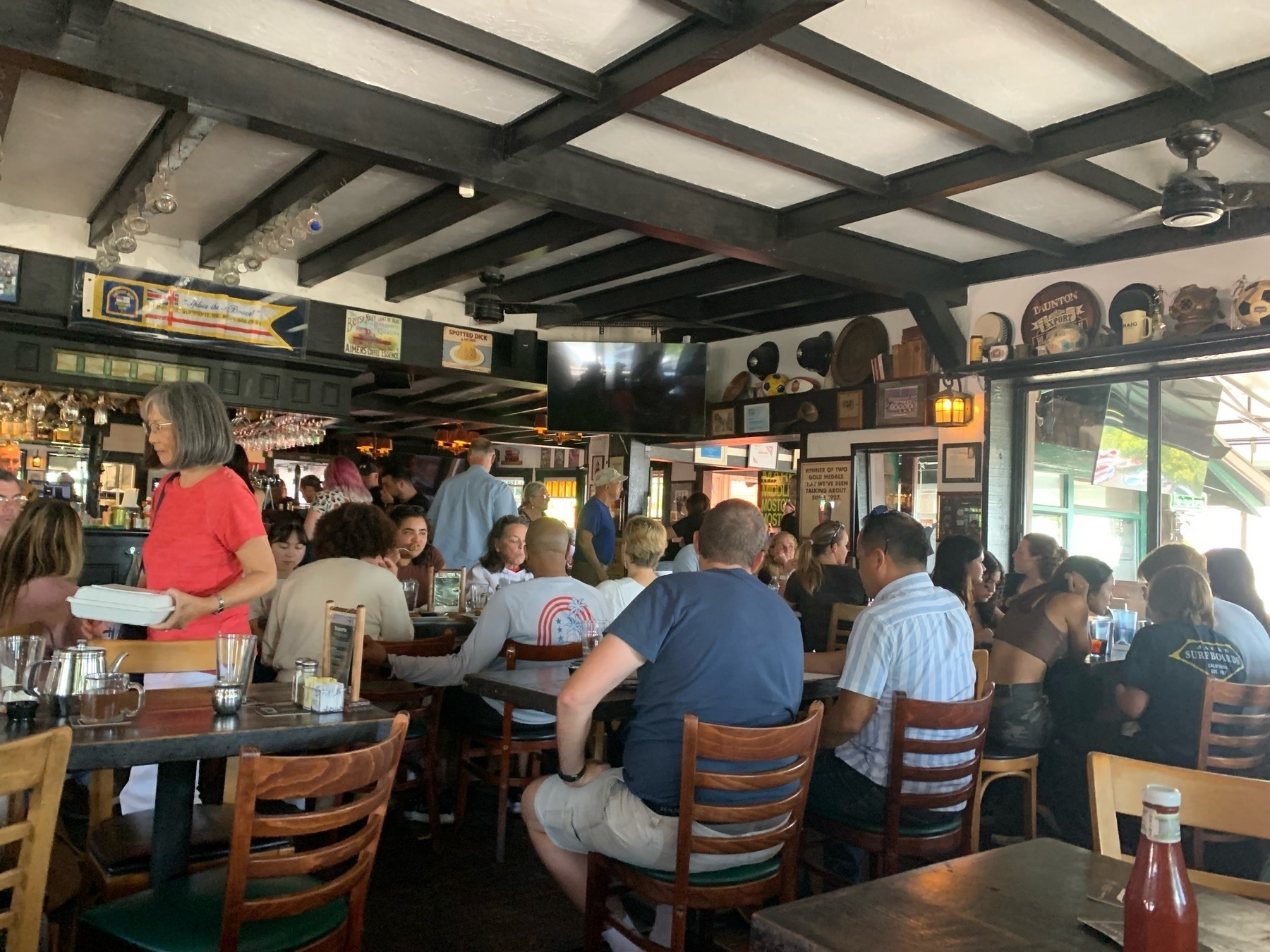

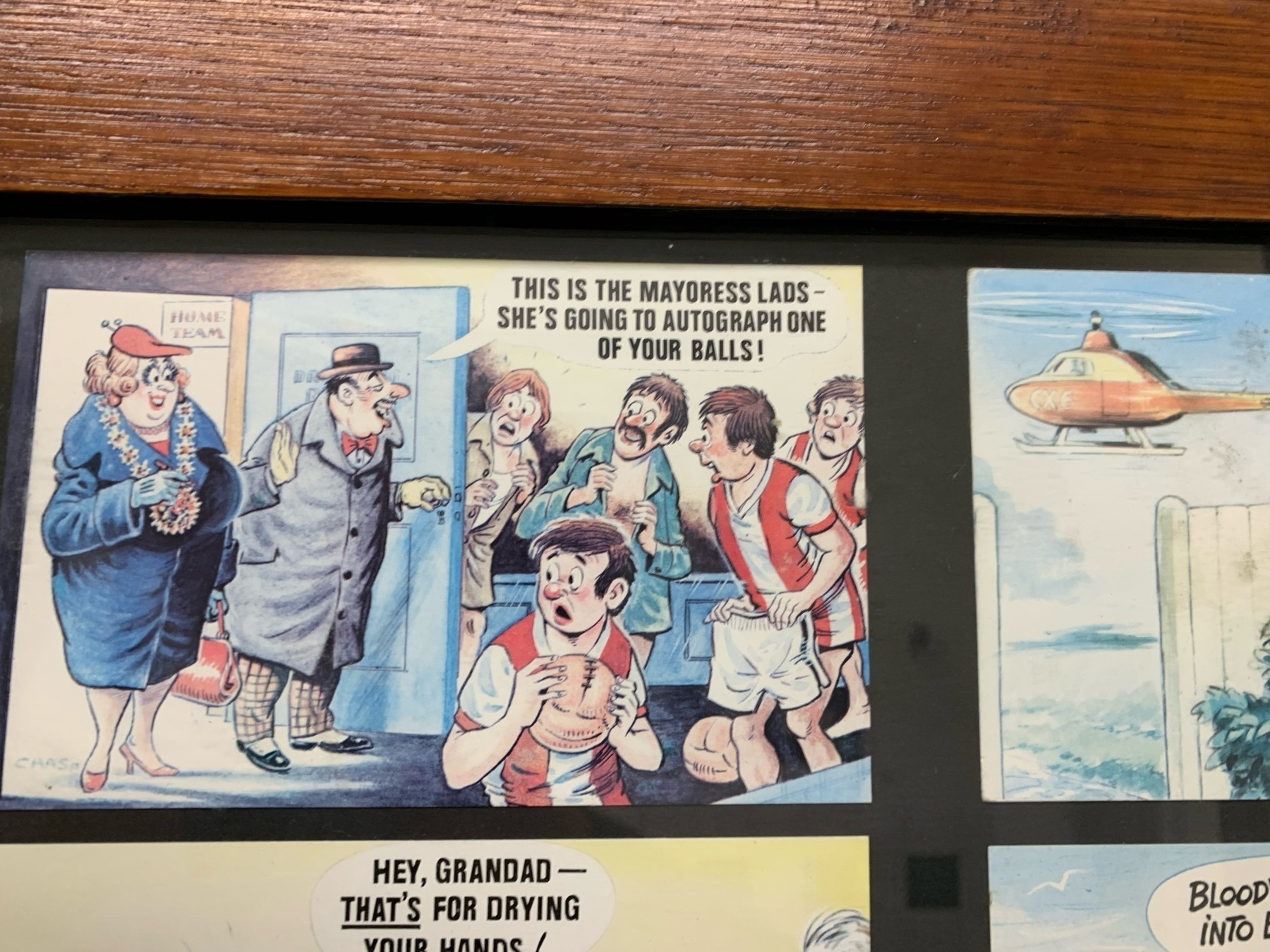
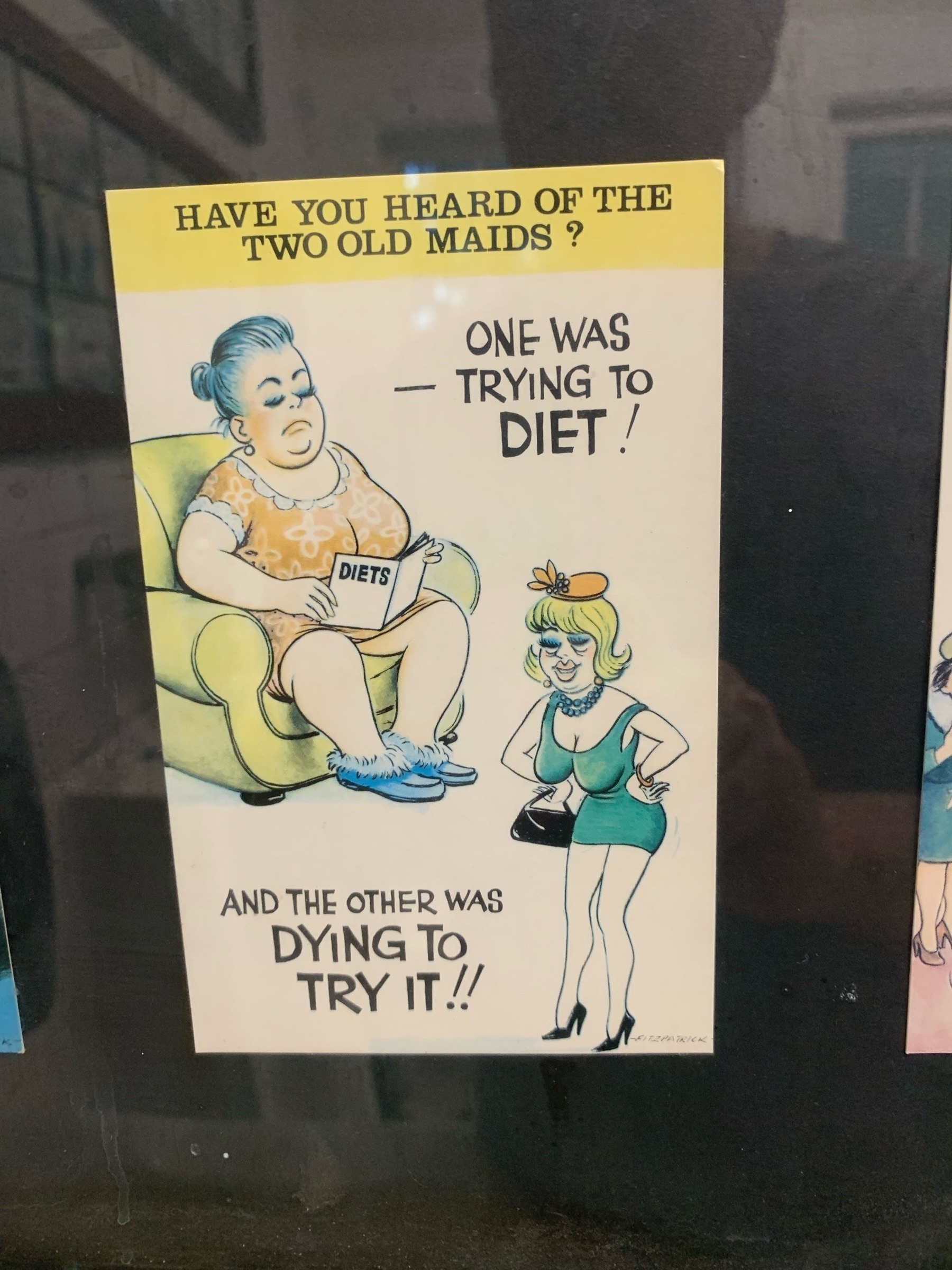
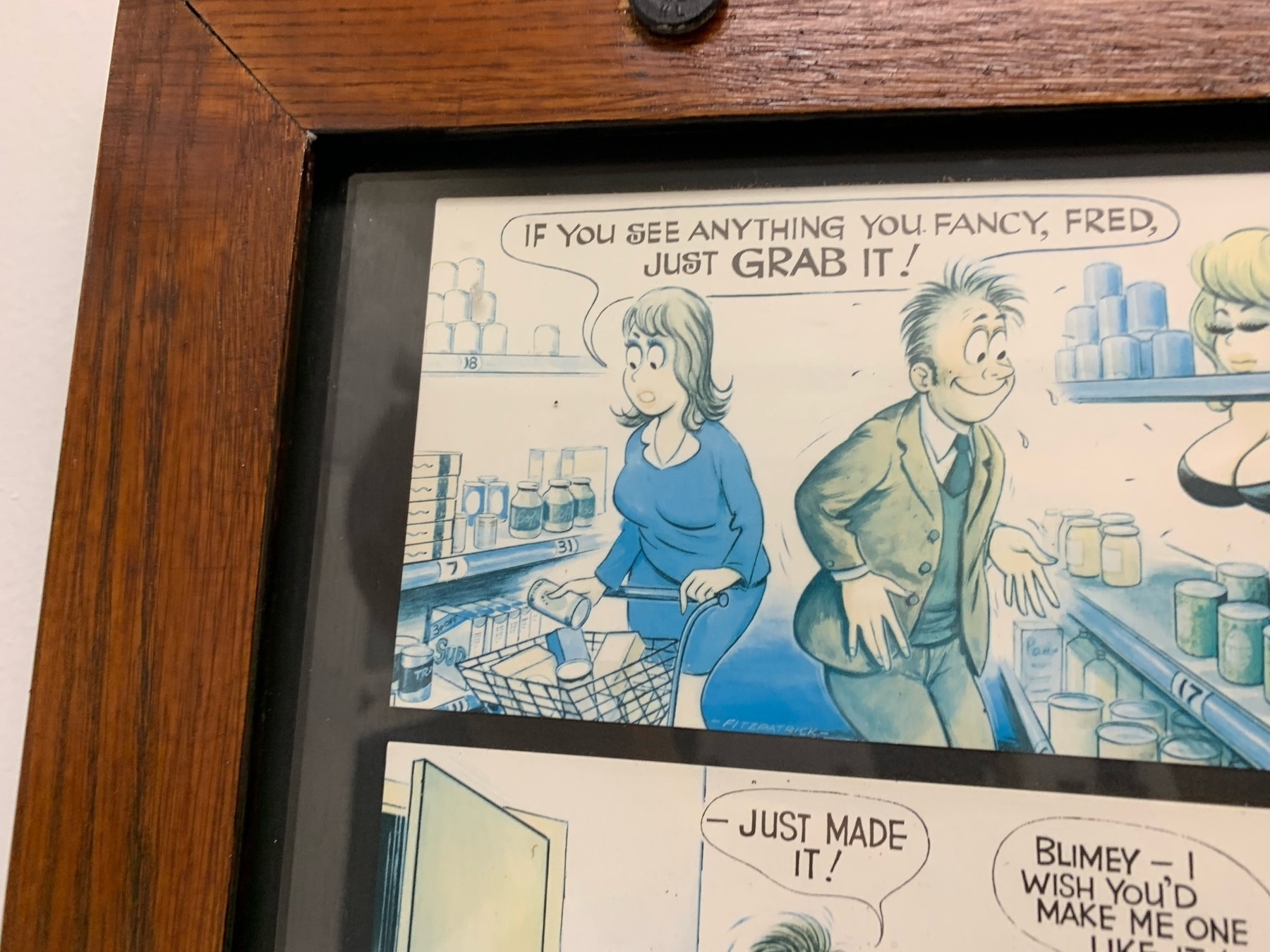

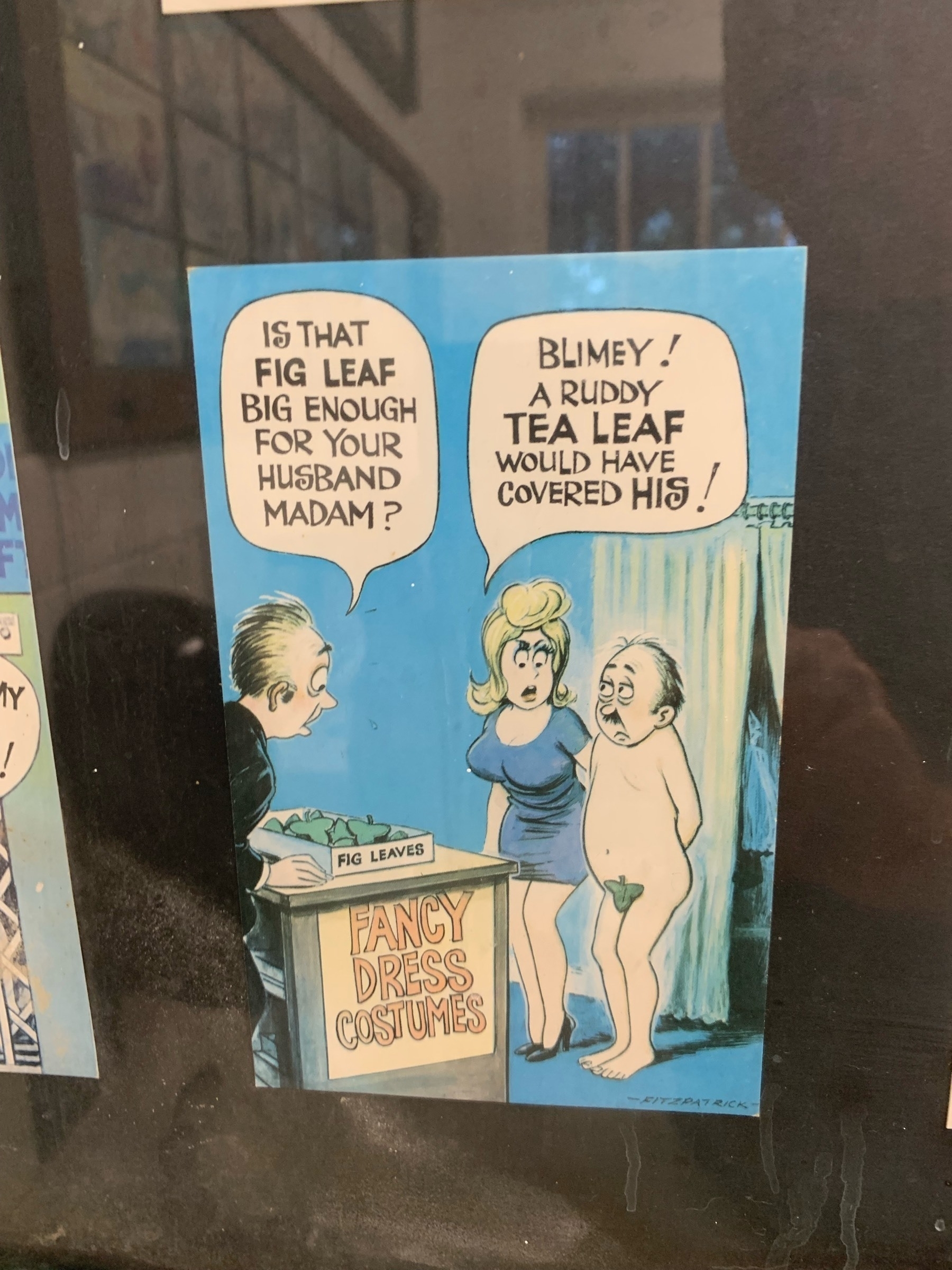
10 fall TV standouts, including “Changeling” debut and “Frasier” reboot.
I’ll give the “Frasier” reboot a try. I’m glad to see “Gilded Age” is returning. “Murder at the End of the World” has the most cliched possible premise and I am there for it.
Two series feature the wonderful Jon Hamm, but alas neither seems appealing to me.

Currently reading: The Silo Series Collection by Hugh Howey 📚
1,663 pages. That’ll take a day or two.
Overheard: me at 13: wow i can’t wait til we have immersive computers everywhere like Star Trek
me at 30: wow i can’t wait until we destroy all computers like in dune
NotebookLM, Google’s AI-powered note-taking app, is the messy beginning of something great. “What if you could have a conversation with your notes?” By David Pierce at The Verge.
Google has a history of shutting down products after a few years, so I’m reluctant to rely on anything new from them.
The Story of Our Universe May Be Starting to Unravel.
Recent astronomical observations are shedding doubt on fundamental theories of cosmology and physics.
… a revolution may end up being the best path to progress. That has certainly been the case in the past with scientific breakthroughs like Copernicus’s heliocentrism, Darwin’s theory of evolution and Einstein’s relativity. All three of those theories also ended up having enormous cultural influence — threatening our sense of our special place in the cosmos, challenging our intuition that we were fundamentally different than other animals, upending our faith in common sense ideas about the flow of time. Any scientific revolution of the sort we’re imagining would presumably have comparable reverberations in our understanding of ourselves.
At Yale’s Long COVID Clinic, Lisa Sanders Is Trying It All
Long-COVID patients, generally speaking, have been very miserable for a very long time, and because the illness attacks their brains, their hearts, their lungs, their guts, their joints — sometimes simultaneously, sometimes intermittently, and sometimes in a chain reaction — they bounce from specialist to specialist, none of whom has the bandwidth to hear their whole frustrating ordeal together with the expertise to address all of their complaints: the nonspecific pain, the perpetual exhaustion, the bewildering test results, the one-off treatments. “These are people who have not been able to tell their story to anybody but their spouse and their mom — for years sometimes,” Sanders tells me. “And they are, in some ways, every doctor’s worst nightmare.” From the perspective of a time-pressed physician under ever-more-stringent productivity expectations, who has at most 30 minutes to do a new-patient intake and 15 for a follow-up, “someone who comes in with a very long story — it just sinks your day,” Sanders says.
In America, the Cheese Is Dead:
… in France the cheese is alive, which means that you can buy it young, mature or old, and that’s why you have to read the age of the cheese when you go to buy the cheese. So you smell, you touch, you poke. If you need cheese for today, you want to buy a mature cheese. If you want cheese for next week, you buy a young cheese. And when you buy young cheese for next week, you go home, [but] you never put the cheese in the refrigerator, because you don’t put your cat in the refrigerator. It’s the same; it’s alive.
I saw this sign while walking the dog. We did not see the bird. 😢🦜
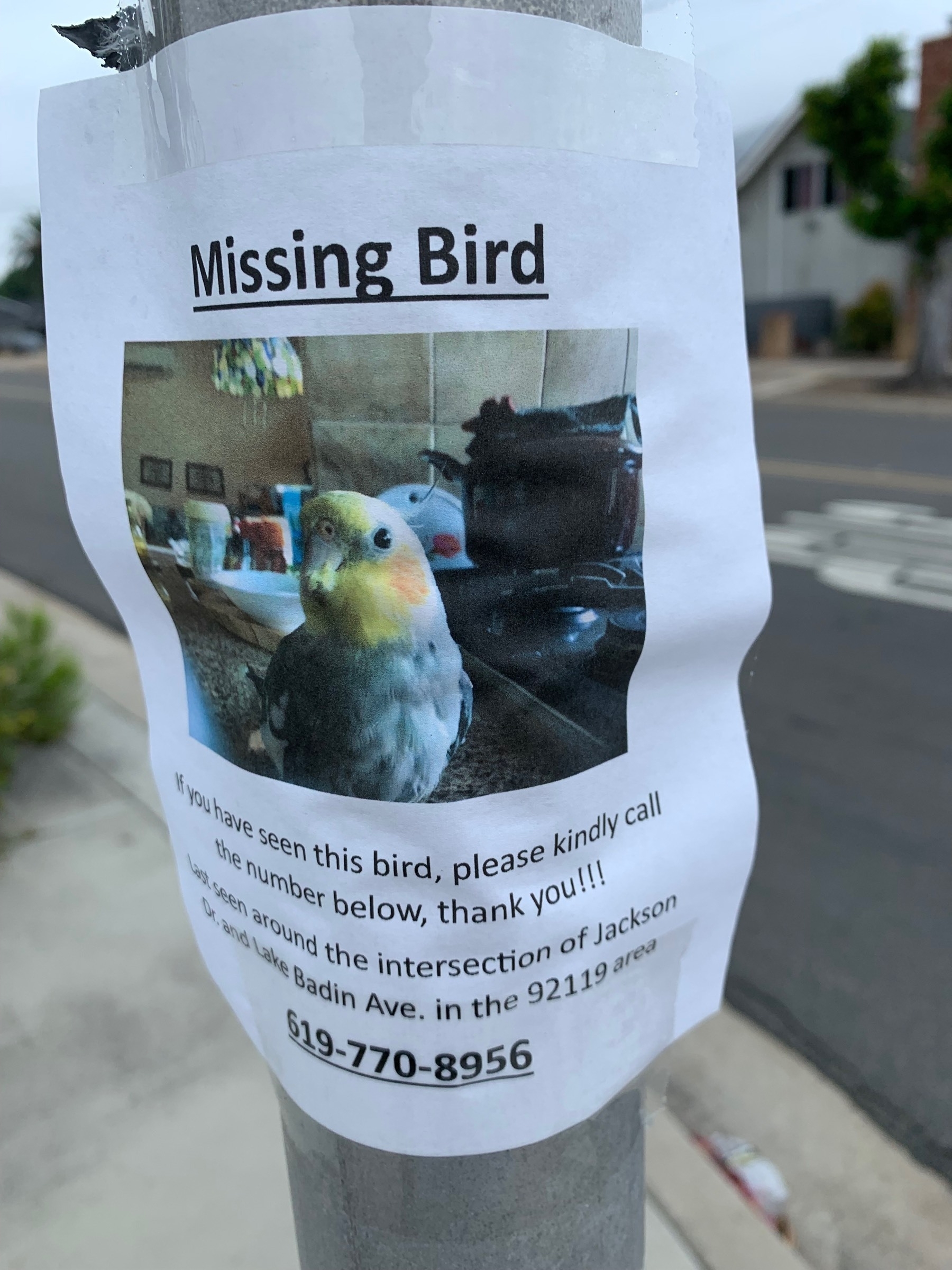
Vivvy would like me to put down the phone and pay attention to her.

Kottke: The Infinite Hotel Paradox. A guest walks into a hotel with an infinite number of rooms….
No, Trader Joe’s employees are not trained to flirt. Or so they would like us to believe!
I loved the final scenes of “Justified: City Primeval” and I hope they’re setting up for a second season. The miniseries was enjoyable but lacked the punch of the original series. Those final scenes supplied the missing ingredient.
Scientologists ask the federal government to restrict Right to Repair. The church says it wants to protect the secrets of its E-Meter, but the change requested by the church could nearly eviscerate the law.
10 years ago this weekend we brought this little girl home.
Poor kid had a rough couple of days adjusting to the new environment. It was a tough couple of months for me and Julie too.
Minnie is the first dog I’ve ever owned. I had no idea what I was doing. I still don’t, but she’s a healthy dog and seems happy so we must be doing something right.

Yes, Brussels Sprouts Taste Better Now—Here’s Why
Brussels sprouts bitter flavor was bred out of them in the 1990s, and ever since then, they’ve been a vegetable you’ll actually want to eat.
Horse- race journalism
Journalists need to stop covering elections like horse races. Don’t obsess over who’s winning—help us decide who to vote for.
Horse-race journalism perpetuates the image of journalists as detached observers.
The horse race fills the insatiable news hole. Every day, a new poll or gaffe. Candidates’ stands on the issues, their experience and competence don’t change much over the course of a campaign—they don’t make news—but they are more important.
Daily Tar Heel staffer Georgia Roda-Moorhead: “We are the Sandy Hook generation. We grew up crouching behind desks in pitch-black darkness, as our teachers barred the doors shut in case a ‘scary person’ stepped on campus."
What time do Americans have dinner? Which state eats dinner earliest? Latest?
Using data from the American Time Use Survey, between 2018 to 2022, we can see the percentage of households in the country who were eating during a given time.
“The Corduroy Appreciation Society was a club where people gathered secretly to celebrate their love of corduroy." On the delightful Articles of Interest podcast with Avery Trufelman.
It's Time to Talk About 'Pandemic Revisionism'
Epidemiologist Katelyn Jetelina discusses school closures, mask mandates and the pandemic response, on the Ezra Klein show, with guest host David Wallace-Wells, a New York Times science and public policy journalist
Political discussions today focus on school, shut-downs, lockdowns, masking, and whether the economic stimulus was too big. We’re not discussing the big question of whether we could have prevented 1.1 million deaths in the US alone.
Katelyn Jetelina is an epidemiologist and the author of the popular newsletter Your Local Epidemiologist. She argues that we’ve entered a new phase of the Covid-19 pandemic: “pandemic revisionism.” In her telling, the revisionist impulse seduces us into swapping cheap talking points for the thorny, difficult decisions we actually faced – and may face again with the next novel virus.
No maybe about it. We will face those questions again.
In the 2020 election, Biden rightly said that Trump was unfit for office because Trump’s handling of the Covid crisis resulted in 200,000 dead Americans. During the Biden administration, far more Americans have died than while Trump was in office, and many of those deaths were preventable
Biden’s Covid policy has been to pretend that the vaccine solved the problem. 900,000 dead Americans disagree.
My 20-year-old self-inking return-address stamp still works. That is some seriously well-made self-inking technology.
Continuing with decluttering my home office. Can all the drawers in all the furniture be junk drawers?
Hi, @mtt! Thank you for the nice work on the Tiny theme and plugins. Regarding the Summary Posts add-in: Would it be possible to configure the add-in so that titled posts are not truncated by default–only truncated when manually adding the relevant code to a post? Thanks!
How can we learn to speak alien? On Inner Cosmos with David Eagleman.
If we meet extraterrestrials someday, how will we figure out what they’re saying? We currently face this problem right here at home: we have 2 million species of animals on our planet… and we have no Google Translate for any of them. We’re not having conversations with (or listening to podcasts by) anyone but ourselves. Join Eagleman and his guest Aza Raskin to see the glimmer of a pathway that might get us to animal translation, and relatively soon.
How To Practice “Productive Procrastination”. By Clive Thompson.
My latest article: Is cloud networking convergence just around the corner? Dell’Oro says yes.. New enterprise cloud architecture requires simplified networking services that unify the network edge, middle mile and public clouds, says the analyst firm.
Clive Thompson: How I Use RSS To “Rewild” My Attention
I use RSS for an hour or so every day to follow specific sites, most of them very popular. Here, Thompson advocates using RSS to find great, weird content. I’m going to try that.
As TikTok Ban Looms, ByteDance Battles Oracle For Control Of Its Algorithm
The relationship between ByteDance and Oracle has become deeply untrusting and adversarial, according to five sources. One source with knowledge of the companies’ actions characterized Oracle’s stance toward ByteDance as a “counterintelligence operation,” rather than a normal customer relationship. Meanwhile, some ByteDance employees wonder if Oracle just wants to run up their bill. The TikTok contract, known internally at Oracle as Project Telesis, has made ByteDance one of Oracle’s most lucrative customers.
When was the first time a waiter asked someone whether they saved room for dessert? Is that guy getting royalties?

Want to read—nonfiction: Empires of the Steppes by Kenneth W. Harl 📚
From landlines to Zoom, a brief 30+ year history of business phone technology and etiquette. By Clive Thompson.
In the 90s, background noise was unprofessional. Today, if somebody’s cat zoombombs the meeting, business stops while everybody meets the cat.
Wanted: A combined RSS/Mastodon client. Yes, Masto generates RSS feeds but that doesn’t give you everything a Mastodon client does.
Cory Doctorow: How the kleptocrats and oligarchs hunt civil society groups to the ends of the Earth:
It’s a great time to be an oligarch! If you have accumulated a great fortune and wish to put whatever great crime lies behind it behind you, there is an army of fixers, lickspittles, thugs, reputation-launderers, procurers, henchmen, and other enablers who have turnkey solutions for laundering your reputation and keeping the unwashed from building a guillotine outside the gates of your compound.
One Weird Trick for Writing a First Draft. By Clive Thompson
Clive Thompson: How I Take Notes When I’m Doing Research
Excellent discussion of “Eternal Sunshine of the Spotless Mind”
On the You Are Good podcast with hosts Sarah Marshall and Alex Steed and guest Rain DeGrey.
The only movie I’ve ever watched more than once in a single day. I watched it three times.
Though it is a great movie, I don’t know if I would call it one of my favorites. But something about it hit me hard on that particular day.
WSJ: Tech Leaders Emerge Behind Plan to Build New City Near California Air Base
Venture capitalists want to build a new city on currently rural land in California. This will go as well as crypto, Web3, and the metaverse.
An ode to “Gilbert Gottfried’s Amazing Colossal Podcast.
I loved this podcast. “… one of the great love letters to twentieth-century Hollywood.”
Some of the best guests were D-list stars even in their prime, who might only be remembered by the narrow age demographic that Gottfried and I shared.
What’s the biology behind why we find some people attractive?. On Inner Cosmos with David Eagleman
Last night before bedtime, I stepped into the backyard and found myself standing with a big red spider a couple of inches in front of my nose.
The spider was about an inch wide, and furiously busy tending its web, scurrying back and forth and moving its legs rapidly.
I took a step back and watched it for a while.
I tried to get a video but it didn’t come out great, and I know spiders give people the fantods so I won’t share the video here.
Casey Newton at Platformer: Why note-taking apps don’t make us smarter.
I’m surprised to learn Casey is a note-taking apps nerd, like me.
And like me he’s a compulsive hoarder of clips and links.
And like me he wants a chatbot to be able to ask the hoard questions and get good answers.
Decluttering continues. Two observations:
• A surprisingly significant amount of the clutter in my office was empty boxes for me to put the clutter in. • Some days I think I’m smart and other days I try to flatten empty cardboard cartons without tearing them.
What Happened to Wirecutter?. By Charlie Warzel at The Atlantic.
I rely on Wirecutter for any unusual purchase under $200. If I need something I’ve never bought one of before, and it’s priced under $200, I just buy whatever Wirecutter recommends.
The police came by to do a wellness check. They said Amazon had requested it because I hadn’t had anything delivered in nearly a month, and they were worried that we were OK.
Things that are annoying me today:
- Password management
- The acronym PTO. I don’t care whether you’re getting paid for taking time off.
- Companies that sign you up for their email list without your permission, just because you did business with them one time.
- Pretty much everything. I’m irritable.

Currently reading: Somebody’s Fool by Richard Russo 📚 A pleasant surprise—I did not know Russo planned another sequel to “Nobody’s Fool.”

Finished reading: This Bird Has Flown by Susanna Hoffs 📚Excellent!
I uncovered this book while decluttering my home office. I loved it when I was a kid, and bought a copy from Powells bookstore on a trip to Portland with Julie in 2008. 📚
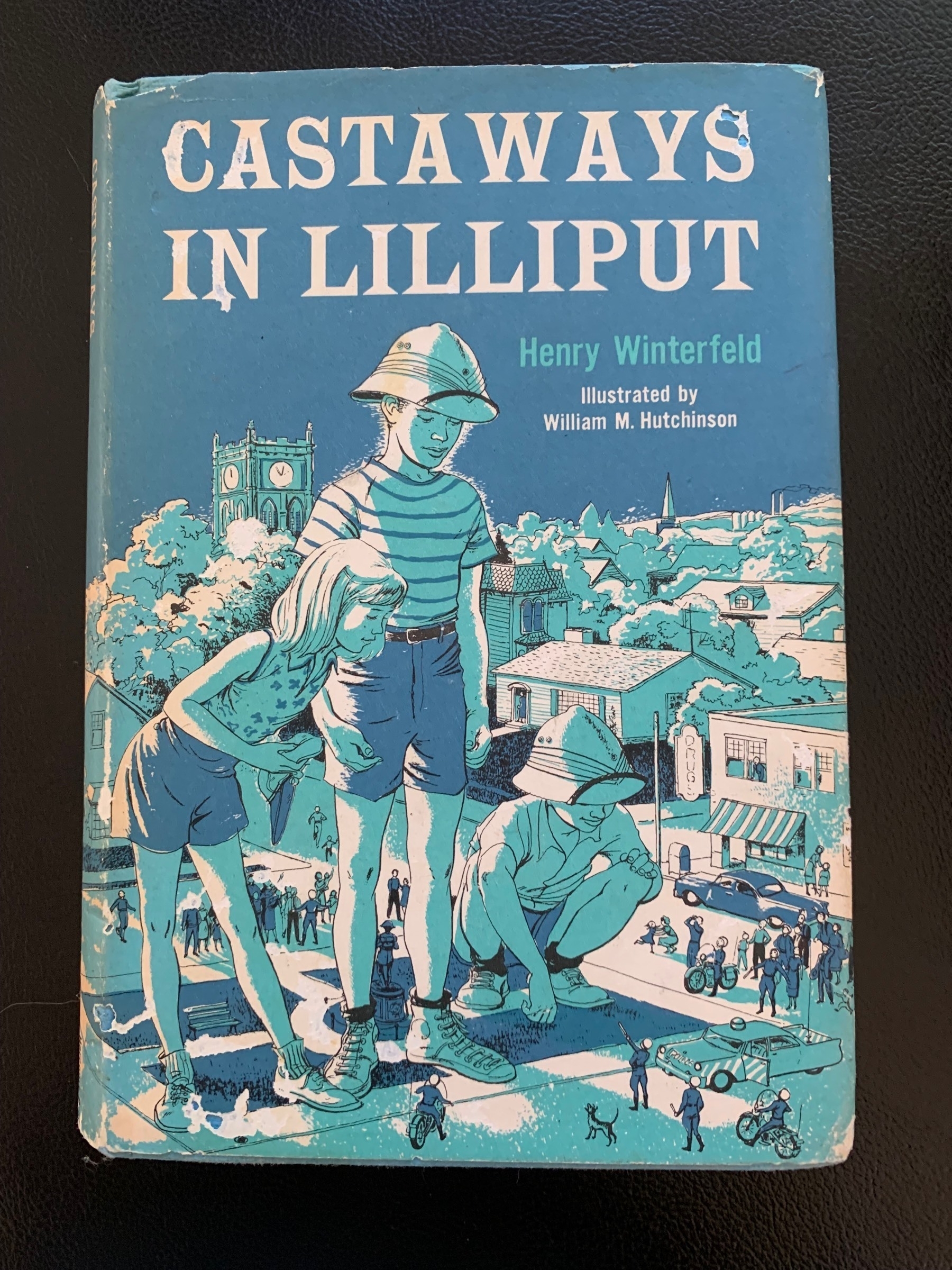
In the course of major decluttering, I just found a ring of keys. It doesn’t fit any of our current locks but I have to keep them rather than throw them out. When we’re dead, our heirs can keep the keys and pass them on to THEIR heirs. Because that’s how keys work.
While walking the dog, I saw this SUV 📷

My latest article: Ancient programming language gets new life in the cloud thanks to IBM, watsonx and AI. An IBM watsonx AI tool helps refactor COBOL mainframe code into Java, to make it easier to maintain and extend for folks who entered the workforce after the disco era.
My friend Marc Gorelick shares lessons from more than 40 years playing the tuba. Can confirm that Marc played the tuba as a teenager. We gave him grief for it at the time, but Marc made the tuba cool.
Watching a security awareness training video as required by a client. Holy mackerel, Doug, stop being such a baby.
I saw this sign. Poor Sadie. 😭😢😭📷

TidBITS is doing a poll on whether Apple users use Apple Weather or some other app for weather forecasts. During yesterday’s weather emergency, I checked Apple Weather several times an hour.
All is well here following the storm. Reviewing the news today I see a dozen people had to be rescued from flooding in the San Diego River. Most likely they were homeless. Many people did not get to sit in their warm, dry houses and watch Netflix yesterday. So I am a little humbled and grateful.
Meanwhile, here in San Diego and nearby Southern California




Unimpressed by Hurricane Hilary. Demoted to a tropical storm. So far, we’ve gotten some heavy rain, but very little wind. Note to Hilary: This is not a challenge.
Tracy Durnell: My Reading Philosophy in 17 Guidelines
I love all 17 guidelines in Tracy Durnell’s reading philosophy.
Two highlights jump out at me.
- “Read according to whim.” Just read whatever the heck you want to read. Classics, trash, whatever.
- Quit reading a book whenever it stops working for for you. Tracy’s rule is “Quit nearly as many books as I finish.” I finish 90-95% of the books that I start and you know what? I think I should be quitting more books. Because I think quitting more books would mean that I’m trying to read a greater diversity of books.
Gradually over time in my adulthood, I found I was reading fewer and fewer books. I got back in the habit a few months ago, and I’m happy about that.
Many adults don’t read books, and if you’re one of those and would like to start, you could do worse than follow these rules.
Small changes in daily activity levels, like doing a little more walking, stair-climbing, chores around the house, and gardening, can burn a lot of calories and have major health benefits. It’s called NEAT—non-exercise activity thermogenesis.
Getting ready for the (actual)(non-metaphorical) storm
I was kicking myself because I only thought to stock up on water this afternoon, and was sure the stores would be sold out. But I decided to try a couple of stores anyway (being mindful that we also need to conserve gas in the car, in case we need to evacuate). First supermarket I went to had stacks and stacks of water bottles in front. I bought five gallons.
We have plenty of people and animal food, meds, flashlights, external power supplies for electronics, and we’ve moved large but blowable items into shelter or tied them down. The backyard actually looks better than it has in years. It previously looked like some kind of ghastly graveyard for lawn furniture.
A couple of the neighbors across the street have small piles of sandbags strategically placed at the corners of their driveways. That’s not a problem for us; the slope of the street directs water away from the front of the house. Julie says the slope of the backyard directs water into the crawlspace under the house in heavy rain, but it’s too late to do anything about that now.
My prediction is much of this preparation will be unnecessary. We’ll get minor damage. I expect we won’t lose power, water, cable or TV. On the other hand, moving and securing blowables was definitely necessary, because we could well get record heavy rain and wind, and stuff tends to blow around even in normal winter storms.
But it’s good to be prepared for worse than you expect.
Rain predicted to maybe start at 2 am, with winds picking up Sunday early afternoon and continuing through mid-evening.
I’m hoping to do my normal morning walk tomorrow, but may give the dog a break.

Finished reading: The Gutenberg Parenthesis by Jeff Jarvis 📚A thoughtful history of five centuries of print as dominant form of information dissemination, culture and conversation, now closing (hence the parenthesis metaphor) and the internet era now dawning.
Preparing for the hurricane
We got the front and back of the house as clear as we could of items that might blow around. Julie did most of the work on that. We have enough food in the house to last a few days. Later today, I’ll check to be sure we have plenty of potable water and that the electronics are charged. I have been thinking for some time of getting a solar-powered battery for electronics, maybe I’ll order something today and it will arrive in time for next time. Longer term, we should put in batteries that can power the whole house.
The fun starts at 2 am, according to the weather forecast. Today is actually a beautiful day, cool and calm and overcast.
Notwithstanding the preparations, I’m optimistic the storm will fizzle. But best to plan for worse.
The pizza delivery guy says the weather outlook is changing rapidly and he is optimistic that when the storm hits it will be weak so that’s good.

Want to read—nonfiction: Reader, Come Home: The Reading Brain in a Digital World by Maryanne Wolf 📚

Want to read—nonfiction: Proust and the Squid by Maryanne Wolf 📚